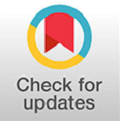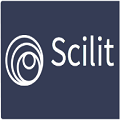Submission Preparation Checklist
As part of the submission process, authors are required to check off their submission's compliance with all of the following items, and submissions may be returned to authors that do not adhere to these guidelines.- The submission has not been previously published, nor is it before another journal for consideration (or an explanation has been provided in Comments to the Editor).
- The submission file is in OpenOffice, Microsoft Word, or RTF document file format.
- Where available, URLs for the references have been provided.
- The text is single-spaced; uses a 12-point font; employs italics, rather than underlining (except with URL addresses); and all illustrations, figures, and tables are placed within the text at the appropriate points, rather than at the end.
- The text adheres to the stylistic and bibliographic requirements outlined in the Author Guidelines.
Copyright Notice
The copyright in this website and the material on this website (including without limitation the text, computer code, artwork, photographs, images, music, audio material, video material and audio-visual material on this website) is owned by QTanalytics India (Publications) and its licensors.
Privacy Statement
QTanalytics highly values our relationship with you and is committed to respecting and safeguarding your personal information and privacy. This policy, along with any other documents referred to within it, outlines the principles governing our handling of your personal information. It covers how we collect, store, and use any personal data you provide to us or that we gather from other sources.
The personal information you may provide can include details such as your name, email address, postal address, phone number, academic institution, affiliation, job title, and area of expertise. This could be collected during various interactions, such as when you register to use our websites, products, or services, subscribe to our services, search for a product, place an order, participate in discussion forums, request a complimentary book copy, apply for a job, report a problem with our site, or request content or information from us.
In certain situations, we might collect data that you've publicly disclosed, like your contact information, research interests, courses you teach, and your institutional affiliation. In doing so, we always consider whether it's in your best interest and the potential impact on your rights. We aim to inform you promptly about our use of your data and your right to object to this, as well as your option to unsubscribe from our communications.
We may also receive information about you from third-party sources. These include business partners such as web hosting providers, email service providers, and list brokers who assist in delivering our products, services, and communications. They might provide additional information about you, including your interactions with content on their websites or your engagement with our emails.
In cases of journal transfers, business acquisitions, or collaborations with societies and associations, we may obtain your personal details.
The information we collect in this manner could include your Internet Protocol (IP) address, browser type and version, device type, time zone setting, etc. We also track details of your visits to our website, including the site you visited prior to ours, your navigation path through our site, and your site activity, such as content searches and views.
License to Use Journal Articles and Related Content
Article in Journal of Business Management and Infomation Systems are published open access under the Creative Commons Attribution-NonCommercial 4.0 International License. The CC BY-NC 4.0 license allows for maximum dissemination and re-use of open access materials and is preferred by many research funding bodies. Under this license users are free to share (copy, distribute and transmit) and remix (adapt) the material. You must give appropriate credit, provide a link to the license, and indicate if changes were made. Non-commercial You may not use the material for commercial purposes.

Please note: For the terms set in italics in the summary above further details are provided on the Creative Commons web page from which the summary is taken (https://creativecommons.org/licenses/by-nc/4.0/). Users may request for any change in permission or question regarding licensing by emailing at support@qtanalytics.in.
How we use your information (and the lawful bases for that processing)
We utilize the personal information we hold about you in several ways:
We use your personal data to fulfill our commitments under any contracts between you and us. This includes supplying the information, products, and services you request from us, as required for contract performance.
We keep you informed about changes to our services, which is necessary both for fulfilling our contractual obligations to you and for our legitimate business interests.
When you opt to access restricted areas of our websites, we may rely on your consent to process personal information necessary for granting you access.
To Enhance Our Products, Services, and Marketing Efforts:
We process your personal information for our legitimate interests, or exceptionally with your consent, to manage our websites and conduct internal operations like troubleshooting, data analysis, testing, research, statistical, and survey purposes.
We aim to optimize our website presentation, ensuring content is effectively displayed for you and compatible with your computer or device.
Ensuring the safety and security of our websites is another area where we use your data.
We assess and enhance the effectiveness of the advertising we deliver to you and others, and provide you with tailored advertising.
For our legitimate business interests, we may inform you about similar goods or services we offer, provided you haven't opted out of receiving such information.
Based on your past transactions, behavior, subject interests, and other data we may have, we make personalized suggestions and recommendations for goods or services that might interest you.
In all these activities, we are committed to respecting your privacy and handling your personal information responsibly and in accordance with applicable laws
Your marketing preferences
If you would like to update your details, including details of how you prefer to be contacted for marketing purposes, you can do this by Sending an email to support@qtanalytics.in/qtanalyticsindia@gmail.com and indicating your new preferences
- If you wish to unsubscribe from marketing emails from QTanalytics you can do send us an email at qtanalyticsindia@gmail.com.
- Sharing information with third parties
QTanalytics Publishing may share your personal information with our business partners who are providing a service to us, for example:
- a platform for a QTanalytics web-based product;
- a provider of web analytics services; or
In addition, where the products or services that you have accessed via QTanalytics are provided by us on behalf of a third party such as an academic society or association, we may share your details with them, unless you have asked us not to.
We may also transfer personal data of article authors, editor and board members and subscribers to our journals in the event that a journal transfers to another publisher (and including where, for example, your personal information is included on a marketing list which is transferred as a significant asset in a business sale or asset sale).
Contact us
If you have any comments, questions or concerns about anything you have read on this page or you are concerned how your personal information has been handled by QTanalytics, you can contact our Information Privacy Officer at qtanalyticsindia@gmail.com.
Changes in our Privacy Policy
If we make changes to this policy we will detail them on this page. If it is appropriate we may provide you with details by email; we suggest that you regularly visit this page to see any changes or updates to this policy.
This policy was last updated in November 2023.






 qtanalyticsindia@gmail.com | Phone: +91-9458270556
qtanalyticsindia@gmail.com | Phone: +91-9458270556